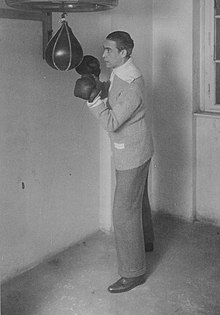Ernst Deutsch
| Ernst Deutsch | |
|---|---|

Deutsch in his gym, 1931
|
|
| Born |
16 September 1890 Prague, Bohemia, Austria-Hungary (now Czech Republic) |
| Died | 22 March 1969 (aged 78) Berlin |
| Cause of death | Heart attack |
| Other names | Ernest Dorian |
| Citizenship | Austrian |
| Occupation | Actor |
| Years active | 1916-1966 |
| Known for | The Third Man |
| Spouse(s) | Anuschka Fuchs (1922–1969; his death) |
Ernst Deutsch, also known as Ernest Dorian (16 September 1890, Prague – 22 March 1969, Berlin), was an Austrian actor. In 1916, his performance as the protagonist in the world première of Walter Hasenclever's Expressionist play The Son in Dresden was praised. Deutsch also played the antihero Famulus in Paul Wegener's The Golem: How He Came into the World in 1920. He is known by English-speaking audiences for his role as Baron Kurtz in Carol Reed's 1949 film noir, The Third Man.
Deutsch was the son of Prague-based German merchant Ludwig Kraus and his wife, Louise. He married childhood friend Anuschka Fuchsin (daughter of Prague industrialist Arthur Fuchs) in 1922. Anuschka's cousin, Herbert Fuchs of Robettin, was the brother-in-law of author Franz Werfel.
Deutsch grew up in Prague, and attended high school. He was a skilled tennis player, ranking seventh on the Austro-Hungarian tennis list. After high school, Deutsch served in the army. He was a childhood friend of Franz Werfel.
In 1914, Deutsch made his stage debut for Berthold Viertel at the People's Theatre in Vienna. After a short season in Prague, Edgar Licho hired him for the Albert Theatre in Dresden, where he moved in 1916. In Dresden, Deutsch played Franz Moor in Schiller's The Robbers and Moritz Stiefel in Frank Wedekind's Spring Awakening. His performance in the title role of Hasenclever's The Son, which premiered on 8 October 1916, established him as an Expressionist actor; he also appeared in the play in 1918 and 1923. In 1917, Deutsch went to the Volksbühne in Berlin. He appeared until 1933 on a number of stages in the city, gave guest performances in Hamburg, Munich and Vienna, and participated in a tour of South America. Beginning in 1916, Deutsch appeared in 42 silent films. In April 1933, he left Germany due to Nazi antisemitism. Deutsch returned to Vienna and Prague, gave guest performances in Zurich, Brussels and (in 1936) London. In 1938 he emigrated to New York City and played briefly on Broadway in 1939 before moving to Hollywood, where he became an American citizen. Beginning 1942 he appeared as Ernest Dorian in Hollywood films, primarily as Nazis and German officers.
...
Wikipedia
